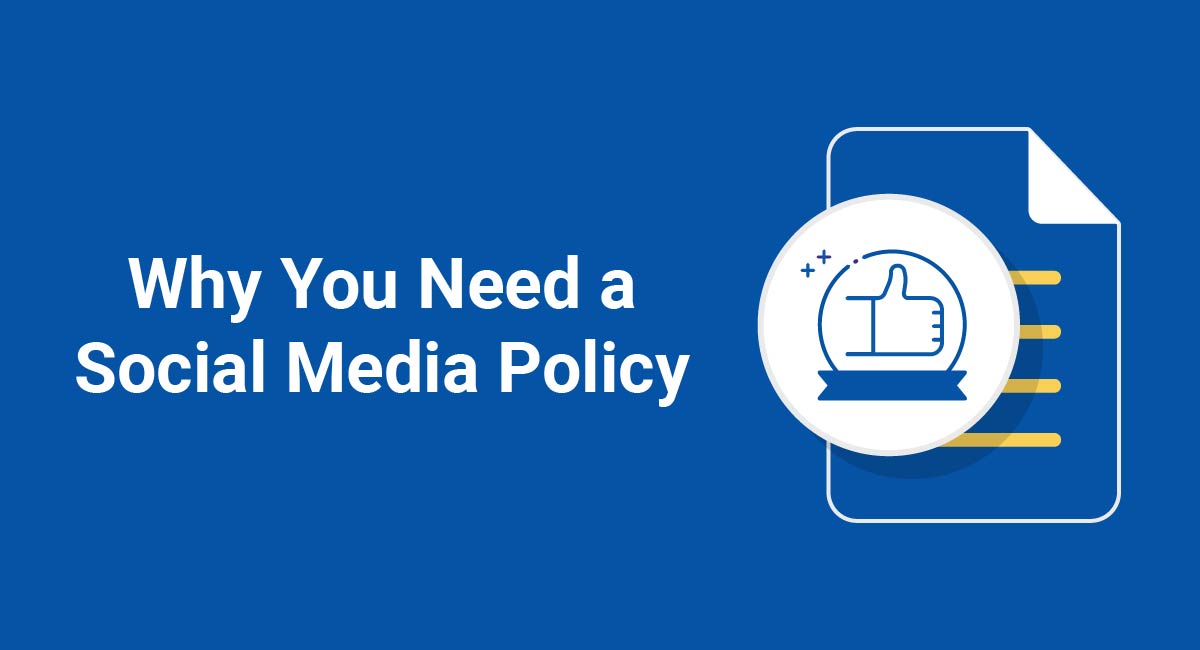Social media has opened up new, highly effective forms of marketing. Your business can derive significant value from endorsements made by social media personalities, bloggers, and affiliate marketers.
But this type of marketing is subject to considerable regulatory oversight. Following a spate of recent warnings, the Federal Trade Commission (FTC) is recommending that any business that engages influencers, bloggers, or affiliate marketers creates a Social Media Policy.
A Social Media Policy will help you keep control of how third-parties promote your business online. This means that you can benefit from social media endorsement without running the risk of upsetting regulators. It also comes with some other important benefits worth considering.
- 1. Do You Need a Social Media Policy?
- 2. FAQ TEST in articles
- 2.1. Case Study
- 3. FAQ TEST in articles
- 4. FAQ TEST in articles
- 5. What is a Material Connection?
- 6. What Counts as a Valid Disclosure?
- 6.1. Twitter, Facebook and Instagram Posts
- 6.2. Videos on YouTube, etc.
- 6.3. Reviews of Free or Discounted Products
- 6.4. Affiliate Programs
- 6.5. Employee Endorsements
- 6.6. Facebook "Likes"
- 7. Examples of Social Media Policies
- 7.1. Defining the Scope of Your Policy
- 7.2. Linking to the FTC's Guidelines
- 7.3. Social Media Posts
- 7.4. Video Endorsements
- 7.5. Affiliate Marketers
- 7.6. Employee Endorsements
- 8. Summary of Your Social Media Policy
Do You Need a Social Media Policy?
Bodies such as the FTC are keen to emphasize that they will enforce their rules against companies that work with influencers, affiliate advertisers, and social media marketers.
FAQ TEST in articles
Here's what the FTC wrote in several warning letters addressed to non-compliant companies:
"If your company has a written social media policy that addresses the disclosure of material connections by endorsers, you may want to evaluate how it applies to the posts identified in this letter and to posts by other endorsers of your products. If your company does not have such a policy, you may want to consider implementing one that provides appropriate guidance to your endorsers."
You should have a Social Media Policy if you receive online endorsements from anyone with a material connection with your company.
Case Study
Let's look at an example of a company that recently came under scrutiny from the FTC and FDA as the result of a social media influencer's endorsement. This is one example of several cases that resulted in the intervention of these regulators.
Vaping promotor Mr. Jay Shrek's Facebook account contained endorsements of various vaping products and accessories. In June 2019, the FTC and Food and Drug Administration (FDA) took interest in several of Mr. Shrek's posts that endorsed products sold by Hype City Vapors LLC:
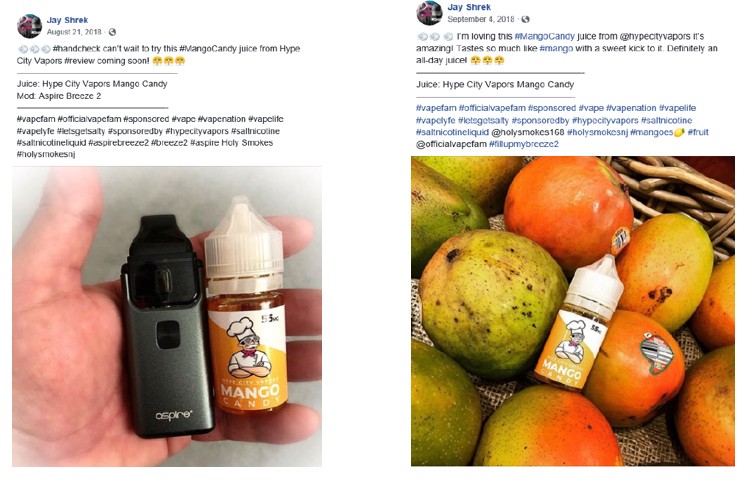
The FDA and FTC wrote to Hype City Vapors LLC with a warning letter:
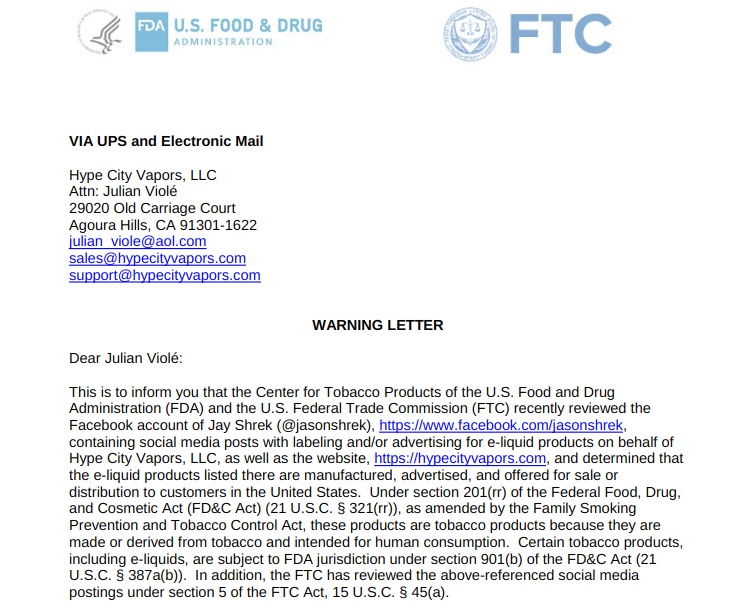
The FDA and FTC told Hype City Vapors that there were several legal violations contained within Mr. Shrek's Facebook posts. These violations concerned:
- The lack of an appropriate health warning
- The lack of any disclosure of a material connection between Mr. Shrek and Hype City Vapors
Regarding the first point, the FDA stated that Mr. Shrek's Facebook endorsements violated 21 CFR § 1143.3, which requires advertisers to make a health disclaimer when promoting tobacco products.
FAQ TEST in articles
Later in the letter, the FTC describes the lack of a health warning as an act of "unfair or deceptive marketing" in violation of 15 USC § 45.
This may not be relevant to your business unless you sell products requiring health warnings or other disclaimers. However, the next point is relevant to any business that solicits endorsements online.
The FTC took issue with the lack of any clear disclosure of a material connection between Mr. Shrek and Hype City Vapors, in violation of the FTC Act 16 CFR § 255.5:
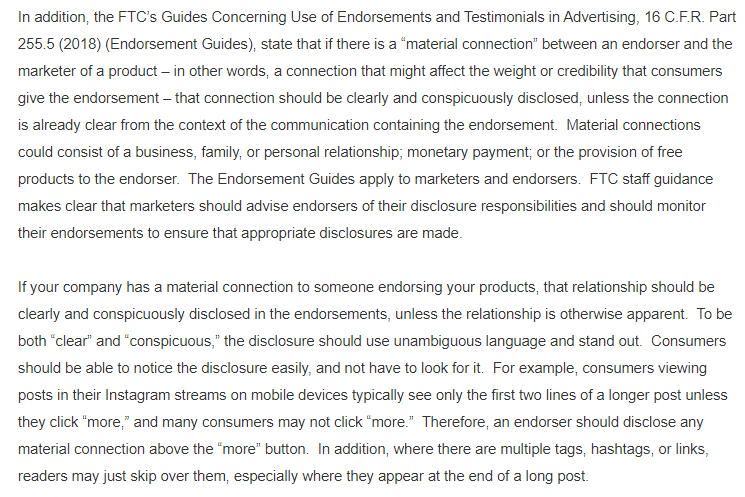
The FTC states that Mr. Shrek should have disclosed any material connection to Hype City Vapors.
The FTC doesn't imply that Mr. Shrek's endorsement was disingenuous, or even that he was paid to make it. But if there's any material link between these two parties - for example, if Hype City Vapors sent this product to Mr. Shrek for free - this requires a disclosure.
The FTC then proceeds to offer Hype City Vapors some advice about the benefits of creating a written Social Media Policy:

The FTC suggests that Hype City Vapors create (or update) a Social Media Policy that sets out guidance for endorsers of their products, to help avoid any further legal trouble.
FAQ TEST in articles
If you think your business might fall under the scope of the FTC's rules on disclosure of material connections, you should consider creating a Social Media Policy to avoid the sorts of problems encountered by Hype City Vapors LLC and many other companies.
What is a Material Connection?

The example of Hype City Vapors LLC shows us that certain endorsements amount to advertisements that fall under the FTC Act, 16 CFR § 255.5.
For an endorsement to fall under the FTC's rules, and thus require a disclosure, there must be a "material connection" between your company and the endorser.
Here's how the FTC Act defines a material connection:
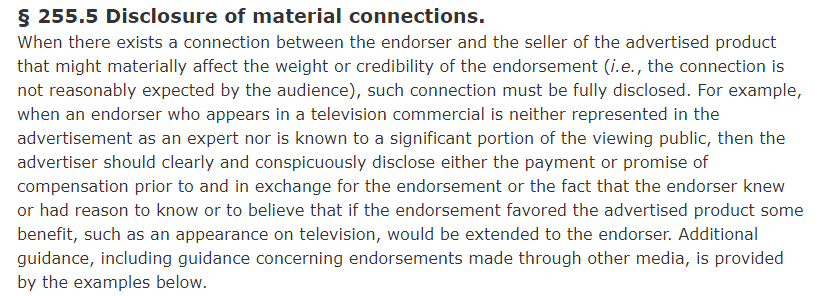
So, if a person endorses your product, they must make a disclosure if:
- They have some connection to your company, and
- That connection might affect the weight or credibility of their endorsement, and
- The person seeing or hearing their endorsement might not reasonably expect them to have this connection to your company
Let's consider some examples. The following things in exchange for an endorsement or review would probably warrant a disclosure:
- Paying the person
- Offering the person goods or services
- Entering the person into a prize draw
- Offering the person publicity
- Giving the person a discount
- Making a donation to a charity of the person's choice
- Lending the person a product
If it's possible that some interaction between your company and the person making the endorsement could influence their opinion, you should ask them to read your Social Media Policy and make a disclosure.
What Counts as a Valid Disclosure?

Many things can qualify as an endorsement on behalf of your company.
The FTC provides extensive guidance on making a disclosure. The FTC doesn't require that endorsers use a specific phrase when making a disclosure, However, it is quite specific in how it interprets the requirements of the FTC Act.
Let's look at some examples and consider how a Social Media Policy could help you manage how people disclose their material connection to your company.
Twitter, Facebook and Instagram Posts
The FTC's guidance contains advice about making appropriate disclosures on social media. You can work these principles into your Social Media Policy to ensure that endorsers are obeying the FTC Act.
Above all, disclosures must be clear and conspicuous. Longer Instagram and Facebook posts are often truncated, especially on mobile. So that everyone can see the disclosure, it's important to place it before the "more" button that reveals the entire post.
Disclosures must be explicit and easy to understand. Wording such as "sponsored" and "ad" is acceptable. Ambiguous language such as "thanks to [brand]" is not acceptable.
Simply providing a hyperlink saying "legal" or "disclaimer" that leads to a disclosure is also not acceptable. The post itself must make the material link between the endorser and your company clear.
Making a disclosure for an endorsement on Twitter may seem like a challenge. But the FTC advises that a disclosure can be valid even if it only consists of one word.
Here's an example from Linus Tech Tips:
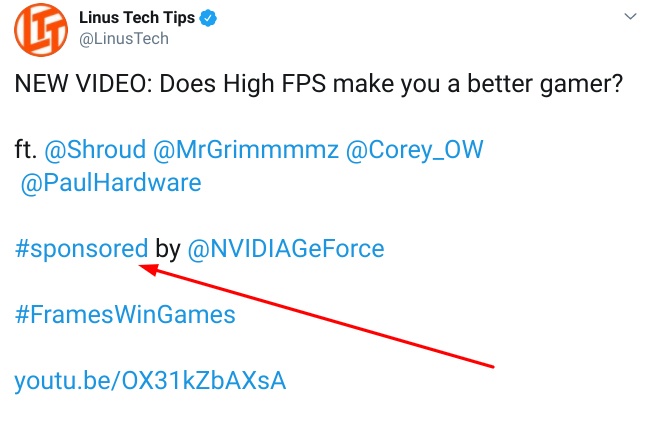
The text "#sponsored" only uses 10 characters. And your endorsers can make an acceptable disclosure using even fewer characters. For example, the FTC states that even "#ad" would be acceptable, so long as the context is clear to whoever is reading the tweet.
Here's an example from TV presenter WIll Gowing:
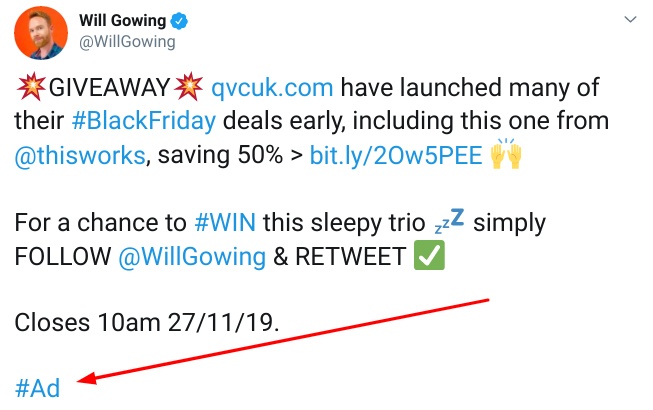
Your Social Media Policy can include guidance for your endorsers about which words to use and where to place them within a social media post.
Videos on YouTube, etc.
If your business has any material relationship with content creators on video-sharing sites such as YouTube, TikTok, etc., you must ensure they make a disclosure.
Here's an example from YouTube coffee expert James Hoffman:
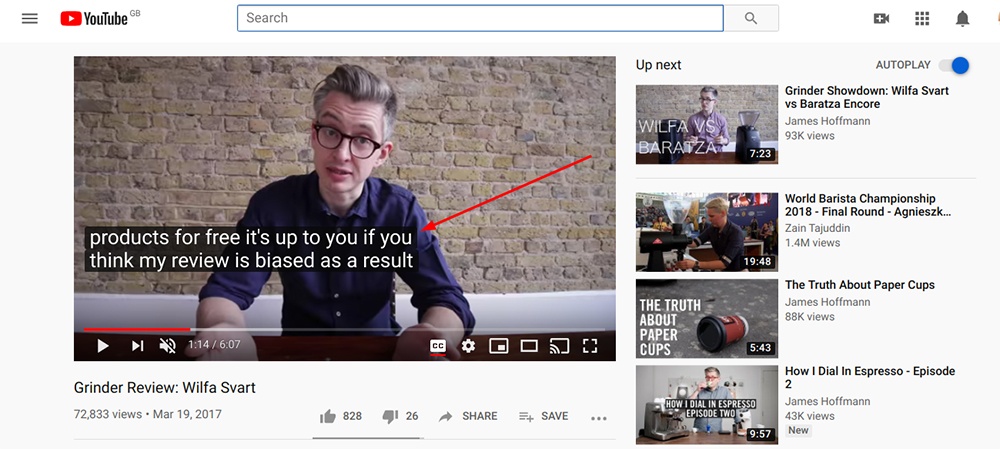
The FTC states that content creators must make a disclosure within the video itself and not just in the video's description. Your Social Media Policy can help ensure that endorsers understand this requirement.
Reviews of Free or Discounted Products
If you offer free or discounted goods or services to a person in order to solicit a review, you must ensure that the person makes a disclosure of their material link to your company. This is true whether the review is positive, neutral, or negative.
Your Social Media Policy can include a section requiring reviewers to make a compliant disclosure.
The FTC advises that disclosures must be:
- Written in an easy-to-read font
- Displayed against a contrasted background so that it stands out
- Worded in a straightforward and honest way
Here's an example of a disclaimer from fashion blog Enjoying a Fuller Life:
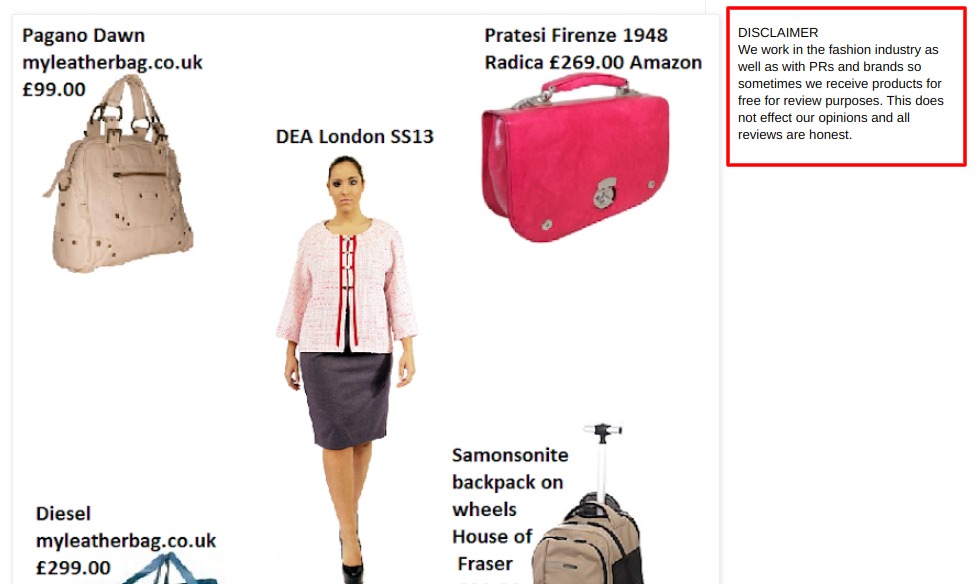
Affiliate Programs
Affiliate programs allow affiliate marketers (typically bloggers, reviewers, and content writers) to earn a commission when their readers purchase products via links on their site.
Earning a commission could affect the credibility of a person's opinion, and so this qualifies as a material connection. Therefore, affiliate marketers must make a disclosure even if they're giving an objective or negative assessment of a product.
Here's an example from PC Magazine:
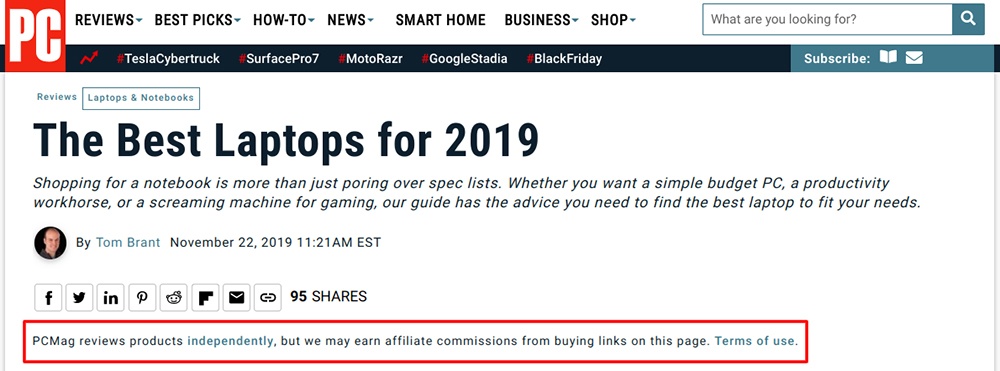
If your business manages an affiliate program,
Employee Endorsements
Your company's employees might genuinely feel like they want to promote it on social media. If you allow your employees to make public statements about your business, you should ensure that they're disclosing their connection to your company.
The FTC advises that it is not sufficient for your employees only to disclose their connection to your company as part of their social media profile. Any disclosures should accompany the actual endorsements themselves.
Here's an example from a General Motors employee on Instagram:

Facebook "Likes"
Encouraging people to "like" your company's Facebook page - for example, in exchange for being entered into a prize draw, or for receiving free or discounted products - is a solicited endorsement. Therefore, this would fall under the FTC's rules.
However, when people "like" your company's Facebook page, there's no way for them to disclose this material connection to your business.
The FTC warns against running these sorts of promotions, as they cannot fulfill the disclosure requirements.
It may seem unlikely that such activities would draw the attention of trade regulators. However, it's important not to promote your business in any way that might be considered deceptive.
Examples of Social Media Policies

We're now going to consider the different sections your Social Media Policy could include, and look at some good examples of how other businesses have created effective policies.
Defining the Scope of Your Policy
As with any policy or agreement, it's important to be clear about when your Social Media Policy applies.
Here's how Norton LifeLock does this:
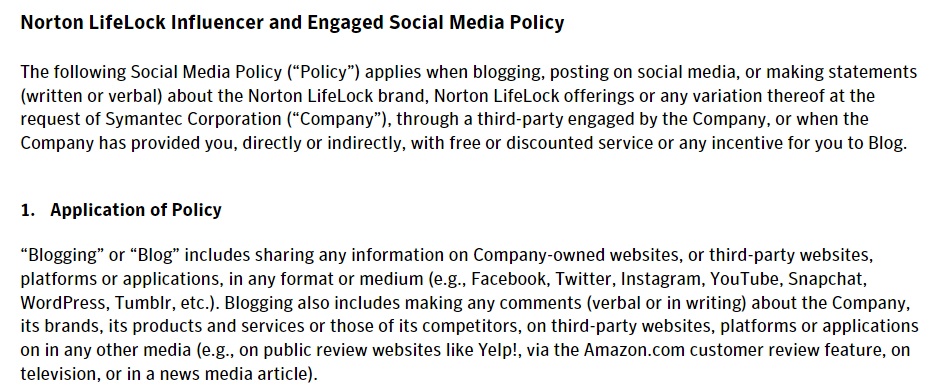
Norton states that its Social Media Policy applies whenever a person makes a written or verbal statement that Norton has incentivized in some way.
Norton uses the term "blogging" throughout its Social Media Policy. However, it defines this term very broadly to also encompass activity on Facebook, YouTube, Snapchat, etc.
Linking to the FTC's Guidelines
Your Social Media Policy should direct endorsers to the FTC's guidelines. You should make it clear that any endorsements must comply with these guidelines.
Here's an example from Nordstrom:
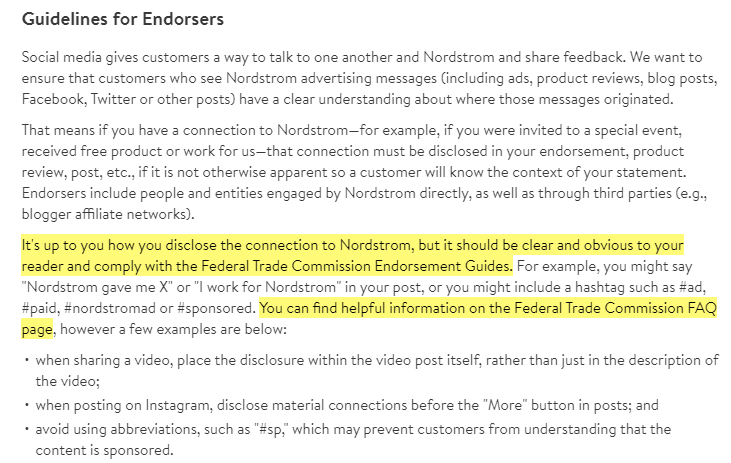
Nordstrom is not prescriptive about how its endorsers make their disclosure. However, it is clear that the FTC's guidelines are the standard that endorsers must meet.
Social Media Posts
You may wish to provide specific text or hashtags for your endorsers to include in social media posts. You can also provide some guidance about how endorsers can ensure their disclosures are clear and conspicuous.
Here's how MapleStory does this:
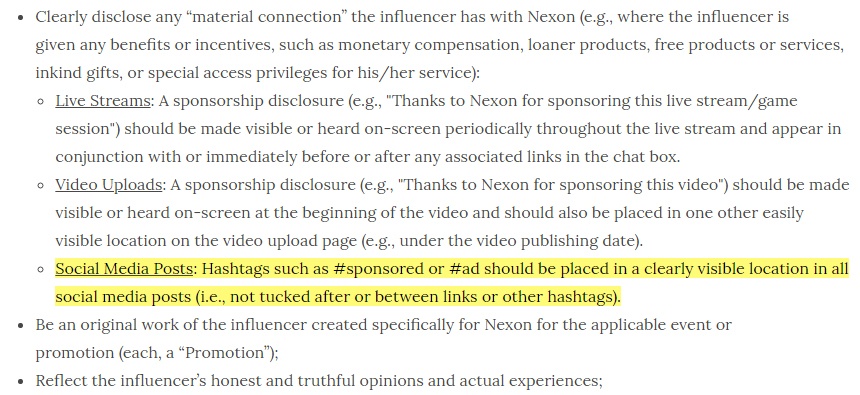
Video Endorsements
As noted above, the FTC requires that video-creators make a disclosure within video footage itself and not simply within a video's description or metadata.
Fullscreen provides some very specific requirements around making disclosures within video content:

Note that by asking endorsers to disclose both in the video itself and in the description, Fullscreen goes further than the FTC strictly requires.
Affiliate Marketers
If your business runs an affiliate marketing program, your Social Media Policy can help ensure that your affiliates know that it is important to make an appropriate disclosure.
Here's an example from Phone Registry:

This clause and section requires that any affiliate marketing follow FTC guidelines.
Employee Endorsements
A Social Media Policy can also help ensure that your employees make an appropriate disclosure when mentioning your company online.
Here's an example from General Motors:

Summary of Your Social Media Policy
A Social Media Policy can help you avoid the stress, financial penalties, and reputational damage that can result from having your marketing practices investigated by the FTC.
Your Social Media Policy should apply whenever your company receives an endorsement from someone who has a material link with your company. It should explain the responsibilities of endorsers under the FTC Act.
An "endorsement" could take the form of:
- A post on social media
- A mention in a video
- A review
- A blog referencing your company or its products
- A Facebook "like"
A "material connection" is created by:
- Offering free or discounted goods or services
- Sending a free product for review
- Affiliate programs
- Entry into a sweepstake or contest
A disclosure of a material connection must be:
- Clear
- Conspicuous
- Easy to understand
- Made directly alongside the endorsement, e.g. in a video, before the "more" button on a social media post

Comprehensive compliance starts with a Privacy Policy.
Comply with the law with our agreements, policies, and consent banners. Everything is included.
